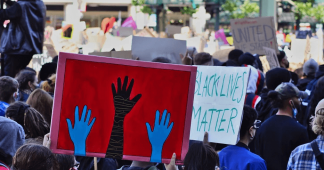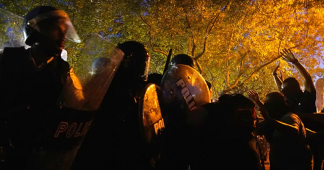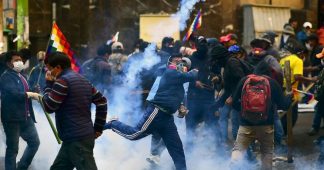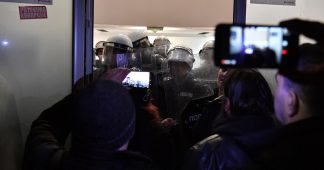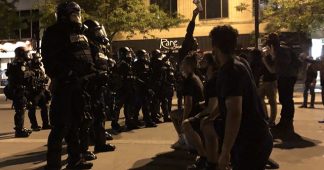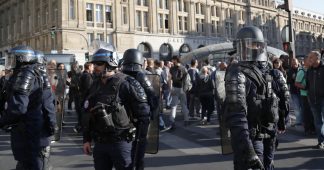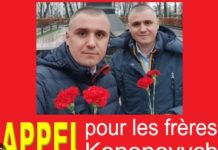Mistaken for mercenaries, armed personnel from federal agencies refuse to identify themselves to street protestors and media.
June 3, 2020
The presence of unmarked federal law enforcement officers, dressed in paramilitary uniforms and wearing no identifying insignia, quickly spread among protesters marching through Washington, D.C.’s streets on Tuesday and Wednesday, causing concerned protesters and officials to ask: Who are they?
In some locations, security personnel refused to identify themselves to journalists and protesters who asked which agency sent them, answering only that they worked for the federal government. In other places, they identified themselves as working for the Department of Justice. Some carried rifles, or were equipped with body armor, riot shields, and pepper spray canisters.
Two such clad security members in Washington on Tuesday night identified themselves to Defense One as part of a specialized emergency response force run by the Bureau of Prisons — part of the Justice Department — to help maintain security at correctional facilities. They and others are part of what’s known as the bureau’s Special Operations Response Teams, or SORTs. NPR reported on Monday that Attorney General Bill Barr had ordered BOP to send its specialized riot response teams to assist with the local D.C. law enforcement with the civil unrest that has engulfed downtown Washington this week
Asked who they’re with, these guys say only that they’re with “The Department of Justice.” pic.twitter.com/ciVDtP8ndk
— Dan Friedman (@dfriedman33) June 2, 2020
On Wednesday, protesters, former national security officials, and legal analysts raised alarms about the refusal of these units to identify their specific agency, and the legal authority under which they are operating. Some critics compared the units to “little green men” — a reference to the unmarked Russian soldiers who appeared in Crimea, Ukraine, prior to its 2014 annexation by the Russian Federation and were compared to the classic plastic toy soldiers. A few of the personnel in Washington on Tuesday wore patches identifying them as BOP or SORTs, but many did not.
“There is no generic DOJ police force, obviously. No badges, no identifying info, refusal to say who they represent — it’s like Russia’s little green men have taken over the nation’s capital,” tweeted Matt Miller, a former DOJ spokesman under President Barack Obama.
Asked in a brief phone call why the units had been ordered not to identify themselves in more detail, DOJ spokesman Kerri Kupec said, “I don’t know anything about that.” In a separate conversation, another Justice Department official who spoke on the condition of anonymity dismissed the concerns as the purview of conspiracy theorists, expressing frustration that officials who were “clearly” part of the enforcement efforts would be mistaken for mercenaries. That official argued that the BOP officers were appropriately identifying themselves as being with DOJ, suggesting that no further detail was required.
Legal analysts have raised questions about what statute authorizes BOP’s use in civil law enforcement efforts. Those nitty-gritty rules dictate what kind of authority the units have — like the power to arrest citizens, for example. That, in turn, dictates how civilians can seek redress for any abuses of power.
“BOP, like other federal, state, and local law enforcement officers may be deputized under the authority granted the US Marshals Service to enforce federal criminal statutes and protect federal property and personnel,” DOJ spokesman Wyn Hornbuckle said in an email.
That legal rationale — ”if this is really what happened,” cautioned national security law professor Bobby Chesney — means that the BOP officers have the same broad law enforcement authorities that any deputy U.S. marshal would, including the power to carry fire arms and make an arrest without a warrant for any offense.
But the officers’ refusal to identify themselves is still “bonkers,” Chesney said. Some security analysts and protesters argued that the BOP’s reticence was an intimidation tactic.
“The authority they [are] operating under dictates what they are allowed to lawfully do. If DOJ is being intentionally vague in order to intimidate citizens, that is abusive,” tweeted former NSA counsel Susan Hennessey.
Other analysts expressed concerns that tactical teams trained to deal with prison riots by inmates may not know how to cope with civilian unrest on city streets.
BOP officers “are trained for specific missions in specific conditions quite different from working with U.S. civilians—convicted of no crime—exercising their protected 1st A rights,” tweeted Diana Bolsinger, a senior fellow at the Strauss Center for International Security and Law.
It was far from clear that BOP personnel were the only unmarked paramilitary forces on the streets, not was it clear how many BOP officers have been dispatched to Washington. A hodgepodge of federal agencies have loaned their forces to support local law enforcement efforts as D.C.’s protests entered their sixth day on Wednesday, and the BOP units sometimes appeared to be intermingled with officers from these other agencies. Officers from the DEA, FBI, DHS and other federal agencies could be seen around the city, as well as thousands of National Guardsmen.
Back outside the White House. Today the perimeter has been pushed back another half block. Federal law enforcement of some kind, but they won’t identify themselves, and all insignias and name plates have been removed. pic.twitter.com/q5dmdMgkLV
— Garrett Haake (@GarrettHaake) June 3, 2020
The BOP did not respond to requests for information on the units by the time this story was published.
Democratic lawmakers and some former military and security officials also have expressed concern.
“Unacceptable for uniformed federal officers policing constitutionally-protected assemblies to refuse to identify themselves to people who pay their salaries,” tweeted Rep. Don Beyer, D, who represents northern Virginia’s 8th congressional district, directly across the Potomac River from Washington. “Denying accountability to the public they serve ensures abuses.” Arlington County, in Beyer’s district, on Tuesday pulled their police forces out of Washington, saying it did not want to participate in Trump’s escalation and commingling of security forces against the protests.
“DC police are required by law to wear badges that must be visible ‘even if wearing riot gear,’” Beyer noted. “But because Trump called in federal agencies to crack down on peaceful protests, people in the nation’s capital once again are treated as second class citizens.”
